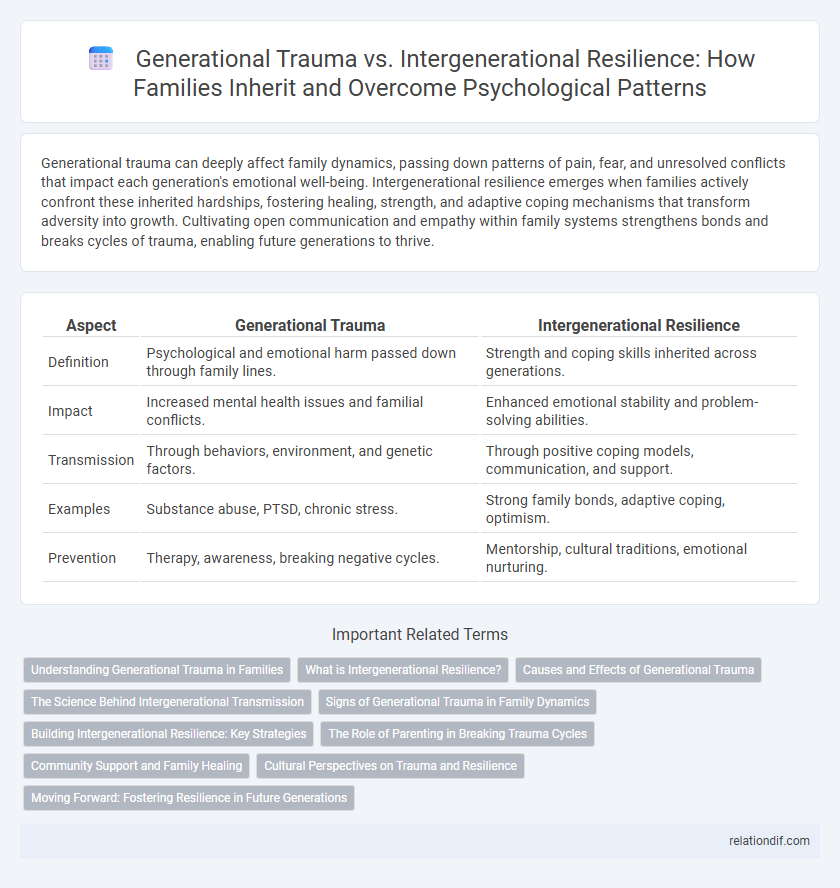Generational trauma can deeply affect family dynamics, passing down patterns of pain, fear, and unresolved conflicts that impact each generation's emotional well-being. Intergenerational resilience emerges when families actively confront these inherited hardships, fostering healing, strength, and adaptive coping mechanisms that transform adversity into growth. Cultivating open communication and empathy within family systems strengthens bonds and breaks cycles of trauma, enabling future generations to thrive.
Table of Comparison
| Aspect | Generational Trauma | Intergenerational Resilience |
|---|---|---|
| Definition | Psychological and emotional harm passed down through family lines. | Strength and coping skills inherited across generations. |
| Impact | Increased mental health issues and familial conflicts. | Enhanced emotional stability and problem-solving abilities. |
| Transmission | Through behaviors, environment, and genetic factors. | Through positive coping models, communication, and support. |
| Examples | Substance abuse, PTSD, chronic stress. | Strong family bonds, adaptive coping, optimism. |
| Prevention | Therapy, awareness, breaking negative cycles. | Mentorship, cultural traditions, emotional nurturing. |
Understanding Generational Trauma in Families
Generational trauma refers to the transmission of historical oppression and its negative consequences across generations within a family, often manifesting as emotional, psychological, or behavioral challenges. Understanding this trauma requires acknowledging patterns of abuse, neglect, or systemic discrimination that influence current family dynamics and individual well-being. Recognizing these inherited wounds enables families to break cycles of dysfunction by fostering intergenerational resilience through healing practices, open communication, and supportive relationships.
What is Intergenerational Resilience?
Intergenerational resilience refers to the positive transmission of adaptive coping mechanisms, emotional strength, and supportive behaviors from one generation to the next, enabling families to overcome adversity and trauma. Unlike generational trauma, which perpetuates cycles of distress and dysfunction, intergenerational resilience fosters healing through shared experiences, cultural values, and collective growth. This resilience shapes family narratives by promoting psychological well-being and empowering future generations to thrive despite historical challenges.
Causes and Effects of Generational Trauma
Generational trauma originates from unresolved traumatic experiences passed down through family narratives, affecting emotional regulation and behavioral patterns in descendants. Causes include historical oppression, abuse, and neglect, leading to increased risks of mental health disorders, substance abuse, and disrupted familial relationships. The perpetuation of these effects hinders emotional healing, yet awareness can foster intergenerational resilience by promoting adaptive coping mechanisms and supportive family dynamics.
The Science Behind Intergenerational Transmission
Epigenetic studies reveal how trauma alters gene expression, impacting multiple generations and contributing to generational trauma. Research on neuroplasticity demonstrates that positive family environments foster intergenerational resilience by rewiring stress responses in offspring. Understanding the molecular mechanisms of trauma transmission highlights opportunities for targeted interventions to break cycles of adversity within families.
Signs of Generational Trauma in Family Dynamics
Generational trauma often manifests in family dynamics through patterns such as emotional detachment, unresolved conflicts, and communication breakdowns that persist across multiple generations. Symptoms include heightened anxiety, trust issues, and repetitive cycles of abuse or neglect, which hinder healthy relationship development. Recognizing these signs early is crucial for breaking the cycle and fostering intergenerational resilience through supportive interventions and open dialogue.
Building Intergenerational Resilience: Key Strategies
Building intergenerational resilience involves fostering open communication, promoting emotional literacy, and creating supportive family environments that acknowledge past traumas while emphasizing strength and growth. Incorporating culturally relevant practices and encouraging shared narratives can help families transform inherited pain into collective empowerment. Implementing consistent rituals and community connections further strengthens resilience across generations, breaking cycles of trauma.
The Role of Parenting in Breaking Trauma Cycles
Parenting plays a critical role in breaking cycles of generational trauma by fostering emotional security, modeling healthy coping mechanisms, and creating nurturing environments that promote resilience. Intergenerational resilience emerges when caregivers actively address past traumas, prioritize open communication, and implement supportive strategies that counteract inherited patterns of dysfunction. Scientific studies reveal that positive parenting interventions significantly reduce the transmission of trauma-related stress, thereby enhancing psychological well-being across multiple generations.
Community Support and Family Healing
Community support plays a vital role in breaking cycles of generational trauma by fostering collective healing and resilience within families. Shared cultural practices, open communication, and access to mental health resources empower families to transform inherited pain into strength and growth. Family healing strengthens intergenerational bonds, creating protective environments that nurture emotional well-being and resilience across multiple generations.
Cultural Perspectives on Trauma and Resilience
Cultural perspectives on trauma and resilience shape how families understand and address generational trauma within their communities. Indigenous cultures, for example, often emphasize storytelling and collective healing practices that foster intergenerational resilience by preserving cultural identity and strengthening social bonds. These approaches contrast with Western models that may prioritize individual therapy, highlighting the importance of culturally grounded strategies in breaking cycles of trauma across generations.
Moving Forward: Fostering Resilience in Future Generations
Family dynamics play a crucial role in breaking cycles of generational trauma by fostering intergenerational resilience through open communication, emotional support, and adaptive coping strategies. Emphasizing healing practices and cultural continuity helps children develop a strong sense of identity and psychological strength, which promotes long-term well-being. Investing in resilience-building programs within families creates a foundation for future generations to thrive despite historical adversities.
generational trauma vs intergenerational resilience Infographic

 relationdif.com
relationdif.com